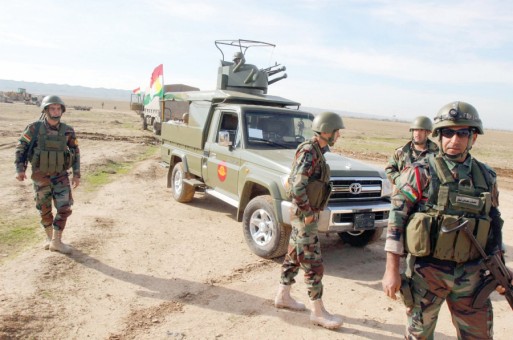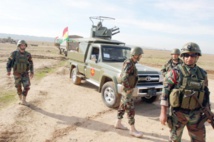In raids west and north of their main Iraqi hub of Mosul in recent days, IS fighters took over the towns of Sinjar and Zumar, further secured the border with Syria by seizing Rabia, and bagged several oilfields in the process.
As part of the fightback, an Iraqi government airstrike smashed a hole in a Mosul building the jihadists had been using as a sharia (Islamic law) court, military spokesman Qassem Atta said.
He claimed 60 Islamic State militants had been killed and 300 prisoners, serving sentences for such violations as smoking or wearing "Western" clothes, set free by the strike.
Witnesses in Mosul confirmed the IS tribunal had been hit but more details were not immediately available.
A senior official from Iraq's Patriotic Union of Kurdistan (PUK) party said Kurdish fighting units from the homegrown peshmerga, the Syrian-based PYD and the Turkish PKK had agreed to share responsibility for the ongoing counter-offensive.
"The fighters of West Kurdistan and the PKK are responsible for confronting Daash (IS's former Arabic acronym) in Rabia and the Sinjar area," said Hallo Penjweny, the PUK's top official for the Mosul region.
"On our side, we are taking care of Zumar and the rest of the area north and east of Mosul," he told reporters.
Sinjar is west of Mosul, Iraq's second city.
West Kurdistan refers to the Syrian Democratic Union Party (PYD), which claims it has already retaken Rabia but it remains unclear how much progress it has made in the Sinjar area.
Another PUK official warned it could be some time before all the civilians can be rescued.
"The PKK is working to open a safe passage for the displaced; it is not easy and it will require days," Harem Kamal Agha told AFP.
- Hunting animals -
Abu Abbas, a 50-year-old irrigation ministry employee who fled Sinjar to Kurdistan, told AFP about the plight of his children and other relatives trapped in the barren Sinjar range.
"The biggest problem now is that they have no food. They have started hunting small animals in the mountains and they eat anything they can find," he said.
"Several children have died already and been buried in the mountain. All the women are giving their milk to the children, regardless of whether they are Yazidi, Muslim or Christian."
"The elders who know some old natural springs are searching the mountain but it's dangerous. On the other side, Daash is waiting for them. I think it will be difficult for any of them to survive longer than two or three more days," he said.
Abu Abbas said he had received scant information on Wednesday because his relatives' phone batteries had run out.
Iraqi government officials said 77 tonnes of food and water had been air-dropped since Tuesday.
The peshmerga are considered the most able military force in Iraq, but their regional government has been cash-strapped and they have struggled to hold the territory they grabbed when federal soldiers retreated in the face of an initial IS onslaught two months ago.
Their withdrawal from Sinjar after hours battling IS militants, left civilians running for their lives.
Notable among them are Yazidis, who are stigmatised as "devil-worshippers" by the jihadists because of their unique blend of beliefs and practices.
- Kurdish unity -
A Yazidi lawmaker broke down in tears during a parliamentary session Tuesday as she urged the government and the international community to save her people from being massacred or starved into extinction.
"We are being slaughtered; our entire religion is being wiped off the face of the earth. I am begging you, in the name of humanity," said Vian Dakhil.
The peshmerga are grappling with IS attacks hundreds of kilometres (miles) further down the front but also east of Mosul, only a few dozen kilometres from the Kurdish capital Arbil.
The Iraq's army sluggish fightback and mounting concern that the IS would seek to consolidate and expand its self-proclaimed "caliphate" straddling Syria and Iraq have led to the unprecedented Kurdish coordination.
The military leader of the PKK, who is hosted in Iraq's Kandil mountains by the autonomous Kurdistan Regional Government (KRG), called Tuesday for a coordinated effort.
"Let's form a joint command. Let's make preparations and take IS out of the areas it occupied, including Sinjar. This is possible," Murat Karayilan said.
In further violence across Iraq on Wednesday, at least 48 people were killed in a string of incidents, including four car bombs in Baghdad, according to security and medical sources.
----------------------------------------------------------------------------------------
As part of the fightback, an Iraqi government airstrike smashed a hole in a Mosul building the jihadists had been using as a sharia (Islamic law) court, military spokesman Qassem Atta said.
He claimed 60 Islamic State militants had been killed and 300 prisoners, serving sentences for such violations as smoking or wearing "Western" clothes, set free by the strike.
Witnesses in Mosul confirmed the IS tribunal had been hit but more details were not immediately available.
A senior official from Iraq's Patriotic Union of Kurdistan (PUK) party said Kurdish fighting units from the homegrown peshmerga, the Syrian-based PYD and the Turkish PKK had agreed to share responsibility for the ongoing counter-offensive.
"The fighters of West Kurdistan and the PKK are responsible for confronting Daash (IS's former Arabic acronym) in Rabia and the Sinjar area," said Hallo Penjweny, the PUK's top official for the Mosul region.
"On our side, we are taking care of Zumar and the rest of the area north and east of Mosul," he told reporters.
Sinjar is west of Mosul, Iraq's second city.
West Kurdistan refers to the Syrian Democratic Union Party (PYD), which claims it has already retaken Rabia but it remains unclear how much progress it has made in the Sinjar area.
Another PUK official warned it could be some time before all the civilians can be rescued.
"The PKK is working to open a safe passage for the displaced; it is not easy and it will require days," Harem Kamal Agha told AFP.
- Hunting animals -
Abu Abbas, a 50-year-old irrigation ministry employee who fled Sinjar to Kurdistan, told AFP about the plight of his children and other relatives trapped in the barren Sinjar range.
"The biggest problem now is that they have no food. They have started hunting small animals in the mountains and they eat anything they can find," he said.
"Several children have died already and been buried in the mountain. All the women are giving their milk to the children, regardless of whether they are Yazidi, Muslim or Christian."
"The elders who know some old natural springs are searching the mountain but it's dangerous. On the other side, Daash is waiting for them. I think it will be difficult for any of them to survive longer than two or three more days," he said.
Abu Abbas said he had received scant information on Wednesday because his relatives' phone batteries had run out.
Iraqi government officials said 77 tonnes of food and water had been air-dropped since Tuesday.
The peshmerga are considered the most able military force in Iraq, but their regional government has been cash-strapped and they have struggled to hold the territory they grabbed when federal soldiers retreated in the face of an initial IS onslaught two months ago.
Their withdrawal from Sinjar after hours battling IS militants, left civilians running for their lives.
Notable among them are Yazidis, who are stigmatised as "devil-worshippers" by the jihadists because of their unique blend of beliefs and practices.
- Kurdish unity -
A Yazidi lawmaker broke down in tears during a parliamentary session Tuesday as she urged the government and the international community to save her people from being massacred or starved into extinction.
"We are being slaughtered; our entire religion is being wiped off the face of the earth. I am begging you, in the name of humanity," said Vian Dakhil.
The peshmerga are grappling with IS attacks hundreds of kilometres (miles) further down the front but also east of Mosul, only a few dozen kilometres from the Kurdish capital Arbil.
The Iraq's army sluggish fightback and mounting concern that the IS would seek to consolidate and expand its self-proclaimed "caliphate" straddling Syria and Iraq have led to the unprecedented Kurdish coordination.
The military leader of the PKK, who is hosted in Iraq's Kandil mountains by the autonomous Kurdistan Regional Government (KRG), called Tuesday for a coordinated effort.
"Let's form a joint command. Let's make preparations and take IS out of the areas it occupied, including Sinjar. This is possible," Murat Karayilan said.
In further violence across Iraq on Wednesday, at least 48 people were killed in a string of incidents, including four car bombs in Baghdad, according to security and medical sources.
----------------------------------------------------------------------------------------









 Home
Home Politics
Politics











